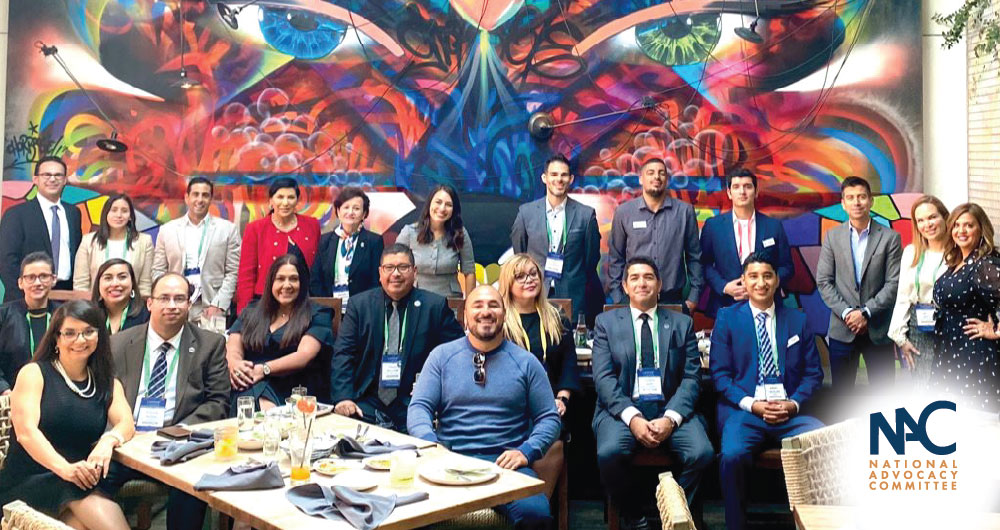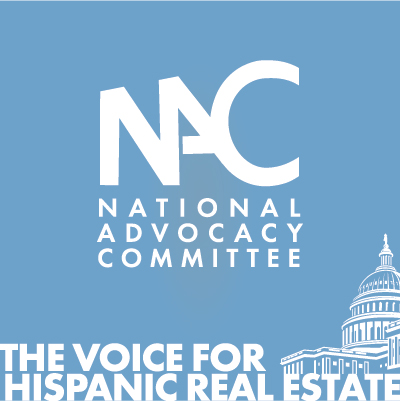One last push on housing supply in Reconciliation
Celebrating NAHREP familia, cultura, politics, and grassroots action
October 7, 2021
Qué onda mi gente?!
For all of you who attended NAHREP at L’ATTITUDE, I think you’ll join me in saying, “what an incredible rush!” The energy at the Manchester Grand Hyatt in San Diego was electric. The air was buzzing with connections, familia reunions, inspiration, empowerment, and love. Don’t think I didn’t see all of you! Everyone was standing a little bit taller, hearts were a little more open, and you all were walking the halls of the hotel owning your space with the rhythm of success that Gary always speaks of. THAT is what NAHREP is all about. I don’t know about you, but I think we all needed that.
Speaking about empowerment, however, I hope all of you memorized some of these key findings from all of the reports that were released at L’ATTITUDE:
- U.S. Latino GDP has grown by $1 trillion since 2010.
- U.S. economic output stands at $2.7 trillion.
- The U.S. Latino GDP is tied with the size of the GDP of France and greater than that of the country of Italy.
And of course, there’s our report: The State of Hispanic Wealth Report
- Latino wealth increased by 63.6 percent while the general population saw a wealth increase of only 17.7.
- Latino homeowners have 28 times the wealth as Latino renters, Latino business owners have five times the wealth as Latinos overall and Latinos with business equity have nine times the wealth as the general population of business owners. And check this out, Latinos with a retirement account have 10 times the wealth as those without. These are HUGE numbers. Download the report!
With Latinos being as young as they are, the influence upon the U.S. economy is set to be even more pronounced with time, as wealth grows with age.
These data points are meant to not only empower us, but also to encourage us to own our space in this time in history, and inspire us to do more not only for our own families but also to elevate the standing of Latinos as a whole. We must own our economic power, because despite Latinos being economic “givers” rather than “takers,” representation in positions of power aren’t reflective of the true role Latinos play in the U.S. economy. And, Latino policy priorities often get overlooked. We must create our own narrative, or else others will absolutely define it for us.
It comes down to one word, familia: POWER.

First Annual Government Affairs Boot Camp
Speaking of power, we held our first annual Government Affairs Directors Boot Camp during the NAHREP at L’ATTITUDE conference where we taught our chapter leaders how to be effective advocates for our mission and our community. One of the participants asked us: “how do we market our policy sessions or sessions with elected officials in a sexier way?” My answer: policy is about power, and last time I checked, power and influence are sexy.
We’ll be resuming our Government Affairs Bootcamp during our National Convention and Housing Policy Summit in Washington D.C. in the Spring. Anyone who is interested in learning about how to become more involved with the National Advocacy Committee can join us then.
Housing Supply and Affordability Act
You might not have known this, but smack in the middle of the conference, we were launching a policy campaign. Everyone who participated in our GAD bootcamp had the opportunity to call their representatives and urge them to include the Housing Supply and Affordability Act and to not gut the housing provisions currently in the Reconciliation package. Many NAHREP members participated in a campaign for the first time in their lives.
If you all remember, the Housing Supply and Affordability Act was part of our State of Hispanic Homeownership Report Policy Priorities we released earlier this year. If any of you have been following the debate happening in Congress, the back and forth on what’s included in the final reconciliation bill is enough to make our heads spin. What we do know for sure is that housing supply provisions are definitely on the chopping block. Putting pressure on our representatives today is more critical than ever. One of the things we’ve heard from representatives is that “any investments in housing supply will not reap any political benefits during the midterm election because we won’t see immediate results.” We need to let our representatives know how problematic that is!
We all know that the number one barrier to advancing sustainable Hispanic homeownership is the lack of affordable housing supply. Today, the U.S. is short at least 6.8 million units of housing in order to keep up with demand.
NAHREP is urging our Senators to support keeping key provisions of the Housing Supply and Affordability Act in the $3.5 trillion dollar budget reconciliation package. These provisions create a new planning grant program to support regions, states, cities, and tribes in their efforts to eliminate barriers and incentivize housing production while also preserving local and regional decision-making and housing policy implementation.
What will it do?
- Encourage the adoption of pro-housing policies and plans at the state and local levels.
- Update building codes and target funding to areas most in need of new housing and where the most significant imbalances exist between the number of jobs and the amount of available housing.
- Spur regional planning and collaboration in areas with more than one jurisdiction and prioritize funding for communities with existing public transportation options.
The time to solve our housing crisis is now! Take action with NAHREP by emailing and calling your Senator today.
Un abrazo enorme familia! Let’s keep the momentum built at NAHREP at L’ATTITUDE going.

About Noerena Limón
Noerena Limón is NAHREP’s Executive Vice President of Public Policy and Industry Relations. Noerena heads the organization’s policy and advocacy efforts on issues ranging from homeownership, housing inventory, credit access and immigration.
Prior to joining NAHREP, Noerena spent six years at the Consumer Financial Protection Bureau (CFPB) and served as a political appointee under President Obama in the White House Office of Political Affairs.




